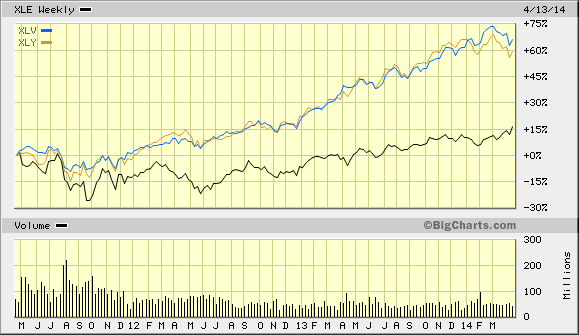Energy ETFs outperformed the overwhelming majority of competing sector investments in the previous bull market (10/02-10/07). In the early part of the run, the war in Iraq boosted the demand for shares. In the later stages of the rally, emerging economic growth fueled speculative excesses in both the price of oil as well as desire for ownership in exploration and/or oil services companies.
The last three years, however, have been remarkably unkind to energy stocks. Whereas the S&P 500 itself has rocketed skyward, the SPDR Select Sector Energy Fund (XLE) annualized at approximately 5.6%. In contrast, SPDR Select Sector Consumer Discretionary (XLY) and SPDR Select Sector Health Care (XLV) logged three-year annualized gains of 20.2% and 23.2% respectively.

In hindsight, one can tether the damage to the energy patch to woes across the emerging economy board. Both China and Brazil have seen significant declines in their domestic outputs. India has battled severe inflation. And Russia? Whether it is a military engagement with Ukraine or a dependence on its natural resources exports, investors have historically shown an aversion to paying much for shares in Russian corporations. It follows that a 3-year bearish period for emerging markets — a period where iShares Emerging Markets (EEM) has floundered — corresponds to the relative weakness in U.S. energy stock investing.

Perhaps surprisingly, the prior three months have painted a different portrait of the global investing landscape. Vanguard Total Stock Market (VTI) has straddled the flatline. PowerShares NASDAQ 100 (QQQ) has lost ground. In contrast, XLE and EEM are gaining heads of steam.

What may be most telling? The most visible members on the 52-Week New High List relate to the energy complex. You will not find Consumer Discretionary (XLY) or Health Care (XLV) there. Nor will you find broader market benchmarks covering the U.S., Europe or the Far East. Yet you will find assets tied to natural gas, energy infrastructure, oil equipment, “fracking†and energy production.

